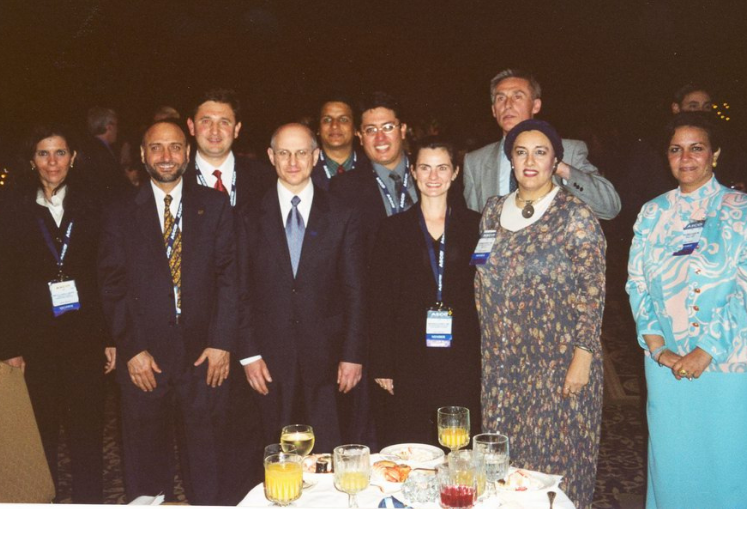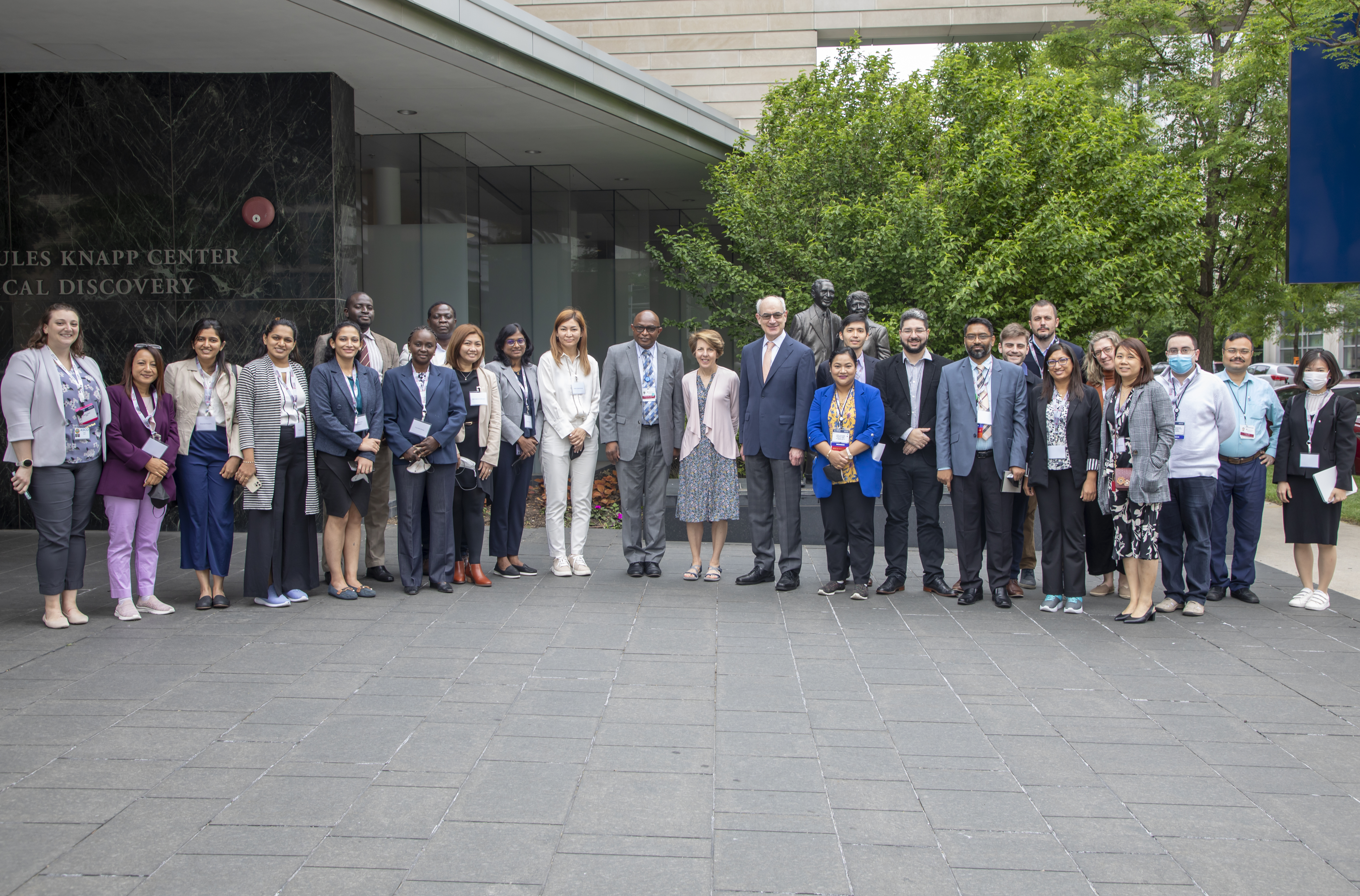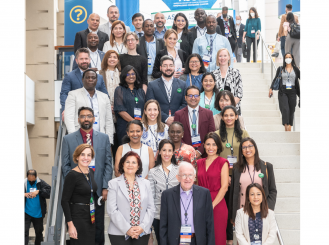Aug 24, 2022
“I have always recognized the fact that the American Society of Clinical Oncology is a misnomer, as we truly are a worldwide organization.”
—Lawrence H. Einhorn, MD, FASCO, founder of the ASCO International Development and Education Award
By Melanie Farrell, ASCO Publishing, and Katherine H. Crawford, MA, PMP, ASCO Communications
To help ensure that members from around the globe are engaged in the oncology community and have the knowledge and resources to deliver the highest quality care wherever they practice, for two decades ASCO has been providing support for early-career oncologists in low- and middle-income countries (LMICs) through its International Development and Education Award (IDEA). The goal is to facilitate knowledge sharing between and among the award recipients and other ASCO members.
“In the 1990s, the international audience for the ASCO Annual Meeting was primarily oncologists from high-resource areas or senior oncologists who had made major contributions to the Annual Meeting, and their travel costs were often covered by industry sponsorship,” said Lawrence H. Einhorn, MD, FASCO. “However, cancer is an equal, if not larger, problem in low- and middle-income countries. Bright and ambitious junior oncologists never had the opportunity to attend the ASCO Annual Meeting because they did not have the financial capabilities. Furthermore, ASCO can be a confusing meeting for a first-time attendee.”
Dr. Einhorn proposed a program that would enable early-career oncologists from low-resource areas to attend the ASCO Annual Meeting, connect with colleagues from around the world, and receive valuable mentorship. And so, in 2002, with the support of what is now Conquer Cancer, the ASCO Foundation, ASCO instituted an International Travel Grant, which was later renamed IDEA.
The IDEA program pairs award recipients with a leading mentor to develop long-term relationships aimed at improving cancer care in their home countries. This mentorship is the foundation of the program, and many mentor/mentee pairs continue their relationship and develop new collaborations beyond the formal conclusion of the IDEA program.
There is a clear need for highly trained palliative care professionals across the globe, particularly in low-resource areas. Early-career oncologists from LMICs with a particular interest in palliative care can apply for the IDEA in Palliative Care (IDEA-PC); their award experience will include mentoring from a palliative care expert and a special focus on palliative care education.
2002-2019: A Focus on In-Person Learning and Connection
In a typical year for the IDEA program, each cohort first meets at that year’s ASCO Annual Meeting, with recipients arriving in Chicago before the meeting officially begins. They have the opportunity to walk through McCormick Place and familiarize themselves with the meeting location before the crowds arrive, network, share professional and personal interests, learn more about ASCO as an organization, and meet ASCO leaders.
“I always have this little speech that I give [to the IDEA cohort] in Chicago on the first day, where I tell them, ‘You are all strangers, and you’re from different places and backgrounds, but in 5 days, at the end of your time in Chicago, you’re all going to be really good friends,’ and they always are,’” said Vanessa Sarchet, an associate director in ASCO’s International Affairs department who oversees the IDEA program. “It’s such a dynamic group plus the excitement of being at the meeting and learning all of the newest research—it’s so fun.”
As their Annual Meeting experience continues, the cohort attends scientific and educational sessions to expand their knowledge and several social events to further their networking, such as the Conquer Cancer Grants and Awards Ceremony, the ASCO President’s Reception, and the World Oncology Leaders reception. Throughout their time in Chicago, the IDEA cohort has a WhatsApp chat going where they can reach out to fellow participants and ASCO staff with questions, observations, plans to meet for coffee and meals, etc.
Their formal participation in the program is capped with a 3-day visit to their individual mentor’s institution in the United States or Canada, to spend several days learning alongside them.
From 2002 through 2019, this format proved highly successful and was well received by IDEA recipients and mentors alike. In 2020, with the profound changes imposed by the COVID-19 pandemic, the IDEA program, like everything else, had to find a new normal.
2020 and Beyond: An Opportunity for Adaptability and Growth
With safety foremost in mind, the ASCO Annual Meeting was offered as an online-only program in 2020 and 2021. The IDEA program followed suit and pivoted to a digital format, with 2020 participants meeting and networking virtually beginning in September of that year. Recipients worked with their virtual mentors for 8 months, focusing on two to three short-term objectives, and participated in an educational webinar series that covered topics of interest to the group, including clinical research, cancer prevention, and IDEA alumni experience. The program continued in a similar virtual manner in 2021, the first and only year that a new cohort of recipients was not selected for the program. Instead, 2021 saw continued virtual engagement with the 2020 IDEA recipients through complimentary access to the virtual 2021 ASCO Annual Meeting; a corresponding virtual networking event had approximately 80 past recipients and mentors in attendance.
As travel restrictions eased, ASCO offered its 2022 Annual Meeting as a hybrid event with both in-person and online experiences. As before, the IDEA program evolved to meet the moment—a moment which included rules about international visitors to hospital campuses, complex and varied international travel and testing requirements, and the continued possibility of an unpredictable virus surge. Rather than disperse across the United States and Canada to a variety of institutions with their mentors, a decision was made to keep the entire cohort together in a single location for the post-Annual Meeting tour. Given that the Annual Meeting was taking place in Chicago, 2021-2022 ASCO president Everett E. Vokes, MD, FASCO, and his colleagues at the University of Chicago generously offered to host the full 2022 IDEA cohort. 2020 IDEA recipients, the first cohort to miss their in-person experience due to the pandemic, were given the opportunity to join the in-person tour.
On June 8-9, 2022, 26 recipients from the combined 2020 and 2022 IDEA classes attended the IDEA program at the University of Chicago. Recipients joined grand rounds, shadowed faculty in different departments, heard lectures, engaged in discussions, and attended a reception.
Even though the group was together at one institution, individual mentorship remained a priority for the program. While recipients did not travel to separate institutions, there was flexibility for the 2022 IDEA cohort to engage with mentors from across the U.S. and abroad who traveled to Chicago to attend the ASCO Annual Meeting. The 2020 class maintained their individual virtual mentors and were encouraged to network with staff at the University of Chicago.
Looking Ahead
As the IDEA program marks its 20th year, IDEA Steering Group members are exploring its full potential to evolve and adapt, especially through virtual onboarding and touchpoints. For example, this year a WhatsApp group was created to connect the 2020 class and the new 2022 cohort, creating a virtual community forum. Several Zoom meetings were hosted leading up to the ASCO Annual Meeting and the University of Chicago tour to encourage recipients to get to know each other and to answer any questions.
Despite the challenges of the past few years, the IDEA program continues to be a meaningful experience for early-career oncologists with a passionate commitment to improving the care of patients with cancer. Whether the experience is virtual or in person, the IDEA program has proven its adaptability and effectiveness in supporting young investigators from LMICs, and ASCO will continue its dedication to this program in the years to come.
That dedication, fittingly, goes in both directions. The IDEA cohort is always a highly engaged group, committed to improving cancer care in their countries, fostering their professional development, and supporting each other in their career journeys. Past recipients host their own alumni gatherings and virtual meetings, maintaining the connections that began through this program. IDEA recipients have gone on to be key volunteers within ASCO, enriching the Society and its mission through their contributions as mentors and on committees, steering groups, and in other essential volunteer roles.
Reflections From Past IDEA Recipients and Mentors
Since 2002, the IDEA program has helped to launch the clinical oncology careers of over 400 early-career professionals from 70 different countries. IDEA program alumni in turn have become mentors themselves, and many have served on the IDEA Steering Group to ensure the program continues to support future generations of oncologists. Meet some of the past recipients and mentors who continue to be engaged with the IDEA program.
Ashley Efraín Alarcón-Rozas, MBA, MD—Hospital Almenara EsSalud – AMEROM, Peru
2002 IDEA Recipient (Inaugural Class); IDEA Steering Group Member
It was great to have an opportunity to participate as one of the first IDEA recipients in 2002. At that time, I was doing my third year of fellowship in clinical oncology here in Peru. Since then, some things have changed with the program. For instance, now you can spend time in a U.S. hospital with your mentor. The IDEA program is really a great stimulus to become an investigator and leader as you translate all your new experience to other doctors in your country.
I am currently a member of the IDEA Steering Group and am happy to participate as a volunteer in many of the tasks developed by ASCO. I became a member of ASCO 20 years ago, and I feel proud to continue working with colleagues of all ages and experience levels from many countries.
Now, my expertise is in breast cancer, especially triple negative [which is very prevalent in Peru], as well as gastric cancer. With my fellows, and taking into account our economic limitation, we have demonstrated that with only different chemotherapy regimens we can improve pathologic complete response in triple-negative breast cancer, for which we have been recognized in Peru and in Latin America. We were part of the ASCO Resource-Stratified Clinical Practice Guidelines Expert Panel for advanced colorectal cancer. I share these recognitions with modesty, but I think it is very important to share because they began with the stimulus I received in 2002 through IDEA.
Cynthia Villarreal-Garza, MD, DSc—Hospital Zambrano Hellion, Tecnológico de Monterrey, Mexico
2009 IDEA Recipient; IDEA Steering Group Member
Being exposed for the first time to an international congress of this nature was a great experience. The most valuable aspect was the opportunity to be assigned [as a mentee] to Dr. Lidia Schapira—a medical oncologist focused on breast cancer and cancer survivorship who is also Latina—and interacting with her in the clinic and seeing how she treats her patients. For me, she represented the first clear example of an oncologist who is dedicated to the treatment of a specific cancer site.
I consider that this was an eye-opening experience in the international sphere, which encouraged my desire to carry out training abroad. Since then, I started looking for opportunities to do a fellowship in breast cancer in the U.S. or Canada. Dr. Schapira wrote me a letter of recommendation that I am sure was very valuable for my fellowship application and the professional opportunities that emerged afterwards.
I personally know people close to me for which the IDEA program was essential to meet their mentor, who then helped them to have more connections and marked their oncology career.
Aleesha Adatia, MD—Aga Khan Hospital, Tanzania
2019 IDEA Recipient; IDEA Steering Group Member
The IDEA program introduced me to many doctors and nurses from across the globe. Our constant communication and sharing of cases enabled better quality of care for my patients. My friends and my mentor continuously inspire me to do more, and as a woman in oncology, I have become more confident to provide best practices for patients with cancer in Tanzania.
IDEA is so important in numerous ways, from capacity building, partnerships with fellow oncologists, training opportunities, and mentorship, to observerships, friendships, evidence-based education, and an easy access platform [of ASCO resources] to learn from. This program structures an easy transformation for oncologists and palliative care experts, especially those who are new in the field. For me, the IDEA program has shaped me to be the better version of an oncologist.
[In the future,] I see an IDEA expert in every country uplifting young oncologists and health care professionals in mentorship, training, capacity building, partnerships with private-public facilities, multidisciplinary tumor boards, implementing evidence-based policies and protocols, and community awareness. We will all be speaking in one wavelength.
Mitchell C. Posner, MD—University of Chicago, United States
2011, 2017, and 2022 IDEA Mentor; IDEA Steering Group Member
Being a mentor for the IDEA program is an incredibly rewarding experience. The time put in is well worth the effort when you witness the enthusiasm and dedication of these young oncologists.
I have an intense interest in working with young surgical oncologists and other oncologists who are trying to improve the standards of cancer care treatment and prevention in their respective countries. A highlight from my time as a mentor was having a surgeon from Bhutan visit the University of Chicago and seeing his dedication to improving cancer care in his small, isolated country and sharing his experiences as an oncologist.
Yvonne A. Efebera, MD—OhioHealth, United States
2016, 2017, 2019, and 2020 IDEA Mentor; IDEA Steering Group Member
I had never heard of the IDEA program until Dr. Richard Goldberg, a GI specialist and one of the leaders at Ohio State, asked me to co-mentor with him. However, he soon left, and I took charge. Coming from Sierra Leone, West Africa, I can appreciate the lack of tools and resources in [low-income] countries. Bringing young investigators here to see firsthand gives them not only hope, but great ideas as to how they can use whatever resources they have to help advance care.
The IDEA program gives hope and [expands] the minds and thinking of these young faculties. Hopefully their exposure, albeit short, opens their imagination to think of new ways to help their country.
Hearing the stories from these young investigators makes me realize how lucky I am to have many resources available to me, but also made me realize that there are many places in the United States where medical care is still like being in [low-income] countries, underfunded and underdeveloped. Additionally, meeting different people from all over the world not only opened my eyes to different cultures, but also to the most important needs in those countries, as each country has different needs and challenges.
More Perspectives on IDEA’s Global Impact
You can read additional commentaries by IDEA recipients, including:
- “IDEA: The First Life-Changing Moment of My Oncology Career in Azerbaijan” by Narmin Talibova, MD, of Comprehensive Cancer Center Ulm (writing about her home country of Azerbaijan)
- "Being an IDEA Recipient From a War-Torn Nation” by Layth Mula-Hussain, MB ChB, MSc, EF, of Sultan Qaboos Cancer Centre, Oman (writing about his home country of Iraq)
- “An IDEA Goes a Long Way” by Aline Lauda Freitas Chaves, MD, MSc, of Grupo DOM Oncologia, Brazil, and Nirmal Lamichhane, MCh, of BP Koirala Memorial Cancer Hospital, Nepal
- “We Can Win, When We Are United” by Gevorg Tamamyan, MD, MSc, DSc, of Pediatric Cancer and Blood Disorders Center of Armenia and Yerevan State Medical University, Armenia
IDEA by the Numbers 2002-2022:
- 410 IDEA and IDEA-PC Recipients
- 70 Countries Represented
- $1.7 Million in Funding From Conquer Cancer
Apply for 2023 International Development and Education Award
Applications are now open for the 2023 IDEA and will close on October 31, 2022. ASCO and Conquer Cancer, the ASCO Foundation, encourage all those who meet the eligibility criteria to apply for the IDEA and IDEA in Palliative Care (IDEA-PC). Find more information about the eligibility criteria and application process.
Interested in Being an IDEA Mentor?
Full Members practicing in the United States or Canada in all disciplines of oncology are encouraged to mentor IDEA recipients. Mentors host their mentees for 3-day visits at the mentor’s institution following the ASCO Annual Meeting and support mentees’ ongoing professional development. Upon the mentees’ return to their home institution, it is expected they will remain in touch with mentors. This ongoing communication opens up opportunities for consulting and collaborating in the future. Complete the Mentor Interest Form, or email idea@asco.org to request additional information.
New This Year: More Ways to Earn FASCO Points
This year, ASCO is providing more opportunities for its members to earn points toward a Fellow of the American Society of Clinical Oncology (FASCO) designation, with a goal of having more members shape the trajectory of the organization and contribute their expertise to advance high-quality cancer care for patients everywhere. The main purpose for updating the FASCO program is to recognize and support members who engage with ASCO in a variety of ways while maintaining the prestige of the designation. IDEA recipients, mentors, and steering group volunteers are eligible for points toward the FASCO designation.
Additional Image Captions:
Image 2: The inaugural cohort of IDEA recipients in 2002.
Image 3: 2020 and 2022 IDEA recipients and 2021-2022 ASCO president Dr. Everett E. Vokes at the University of Chicago following the 2022 ASCO Annual Meeting. To streamline COVID testing and travel requirements, the University of Chicago faculty generously hosted the entire 2020/2022 cohort for their tour.

